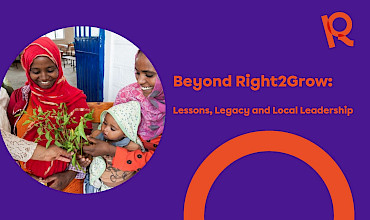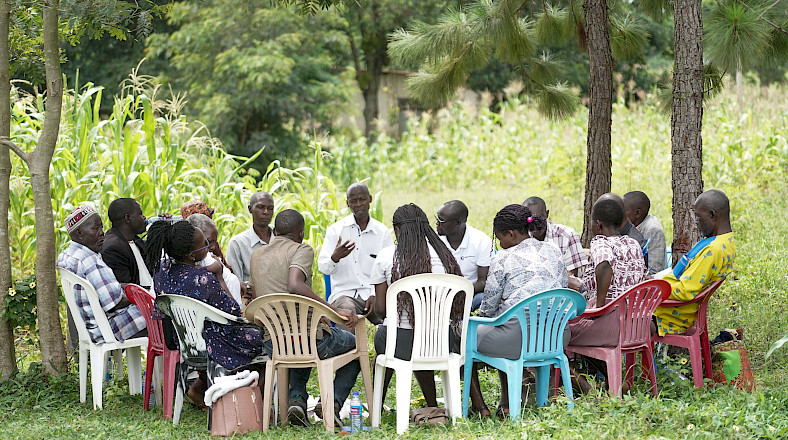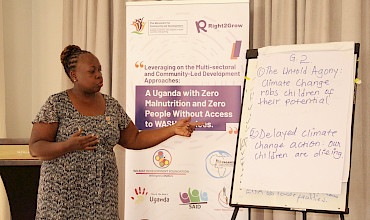
Research findings are often considered as too theoretical and complex, leaving development professionals, advocates and communities hesitant to utilize them. To ensure that research findings do not only reflect real community needs but are also embraced by the people they aim to serve, the Right2Grow programme developed a transformative, locally-led approach to research and generate evidence for advocacy.
This innovative, locally led research driven by the ‘Trio Fantastico’, a unique collaboration among a local researcher, an advocacy expert and a community knowledge holder has forged a powerful link between community insights, scientific research and policy advocacy in Mali, Uganda and Bangladesh. This team leads the creation of context-specific, community-driven evidence that informs better policymaking.
By empowering communities to help define research questions, collect data, analyze findings and craft actionable recommendations, this approach has bridged the gap and ensured that research outcomes truly reflect local needs and are useful for policy and decision making.
Mali: Integrating WASH and Nutrition for Improved Health Outcomes
Right2Grow, through the locally-led research initiative, sought to explore how Community Nutrition groups known as GSANs could support a multi-sectoral approach to WASH and nutrition in Mali. While GSANs have made strides in tackling malnutrition by raising awareness on good nutrition practices, including some practical demonstrations and home visits, their role in promoting adequate WASH practices/ behaviours remained limited. To bridge this gap, ‘Trio fantastico’ from Mali conducted the locally-led research using interviews, focus group discussions and field observations with data analysis facilitated by N'VIVO software. By integrating diverse perspectives and sources of information, they developed a comprehensive understanding of GSANs' potential to address both nutrition and WASH needs.
Findings highlighted the importance of enhancing the GSANs’ toolkit to address water, sanitation and hygiene practices which communities identified as crucial for holistic health improvements. GSAN members recognized the value of this integration and voiced enthusiasm for updating their toolkit to reflect this need. The benefits of the GSAN approach were already evident, as it was credited with addressing undernutrition and encouraging women to seek healthcare proactively.
The research recommendations like integration of the GSAN approach into national plans, policies and budgets and strengthening funding for GSANs, when fully adopted, are a strong pillar for improving nutrition and WASH outcomes, maintaining community motivation and ensuring a sustainable impact.
Uganda: Addressing Gender Dynamics in WASH and Nutrition
While both men and women play vital roles in family health, traditional gender roles in Uganda continue to affect access and utilization of WASH and nutrition services. Typically, responsibilities related to WASH and nutrition fall to women, yet decision-making power often resides with men. This imbalance often leaves women with the burden of managing WASH and nutrition but without the authority to make crucial decisions.
The ‘Trio fantastico’, to gain comprehensive insights explored the impact of gender roles on access and utilization of WASH and nutrition services . Through data collection via focus groups and key informant interviews, supported by N'VIVO data analysis, the study uncovered that negative cultural beliefs and perceptions about gender roles are deeply ingrained, with men typically seen as household heads and ultimate decision-makers, even in areas where they have minimal involvement. Women, in turn, face barriers to asserting their views on matters affecting family health. Additionally, patriarchal norms contribute to low self-esteem among women, who feel marginalized and lack influence over household decisions on WASH and nutrition. In some cases, men viewed their wives as "foreigners" in the household, sidelining women’s input on health-related issues. Some men also expressed concerns that women would make "unwise" decisions if given authority, a view that curtails women’s participation in household decision-making and limits progress in improving WASH conditions and nutrition outcomes.
The study highlights the need for a multifaceted approach to challenge these gender-based barriers and foster equitable access to WASH and nutrition services. Based on the findings, the ‘Trio fantastico’ recommends more support towards economic empowerment programs tailored for women to enhance their economic influence within households and addressing misconceptions about women’s empowerment by involving men in promoting equitable practices.
They also call for a more balanced approach to family health, ensuring that women’s voices are included in local committees such as Water User Management Committees thus increment of their role in community health decisions. Furthermore, the ‘Trio fantstico’ from Uganda, based on the collected data and research findings, recommends joint messaging on WASH, gender equality and nutrition by the district and other local government sectors. They also recommend activation of systems that will support data-driven advocacy efforts as well as including specific indicators in national action plans to track progress in gender, WASH and nutrition, ensuring a targeted approach to overcoming these barriers.
Bangladesh: The Role of Local Entrepreneurs in ensuring access to basic Nutrition and WASH services and products
In Bangladesh’s coastal regions, harsh climate conditions and frequent flooding make access to basic WASH services challenging, with adverse impacts on child health and nutritional status. High rates of stunting, wasting and malnutrition among children under five remain critical issues, exacerbated by barriers in accessing essential services and products. Since 2021, the Right2Grow programme has been working to address these challenges, engaging local entrepreneurs (LEs) to play a central role in ensuring access, availability, and affordability of nutrition and WASH goods and services in these vulnerable areas.
The ‘Trio fantastico’ from Bangladesh explored how local entrepreneurs contribute to improving WASH and child nutrition. The research findings revealed the importance of local entrepreneurs in enhancing access to WASH and nutrition services, with significant contributions to community health, economic growth and progress toward the Sustainable Development Goals (SDGs).
However, the results indicate that communities still face barriers including high product costs, limited accessibility, climate-related obstacles, financial constraints, quality concerns, knowledge gaps and gender disparities. Despite these challenges, local entrepreneurs are making notable strides by designing products that cater to community-specific needs, promoting good hygiene practices and ensuring last-mile distribution to reach remote areas. The findings show that local entrepreneurs use insights into local customs and preferences to design relevant and culturally appropriate WASH and nutrition products. They collaborate with NGOs, government bodies and other private sector entities to enhance their capacity, secure resources and expand their reach. Additionally, entrepreneurs actively engage in community education efforts, raising awareness about the importance of proper hygiene and nutrition practices for children’s health. Some entrepreneurs specifically target gender-related disparities by making products like menstrual hygiene items accessible to women and adolescent girls. Local entrepreneurs play a crucial role in bridging the gap between urban supply hubs and rural households, ensuring essential products reach even the most remote families.
To overcome existing barriers and enhance the role of local entrepreneurs, the ‘Trio fantastico’ proposed several policy and programmatic recommendations including establishment of a supportive policy framework, improvement of access to financing, promotion of gender-inclusive policies and implementation of climate-resilient solutions.
The ‘Trio-Fantastico’ also recommended provision of local entrepreneurs with training in business management, quality standards and financial management, participation in entrepreneurial projects and use of social media to dispel cultural misconceptions around WASH and nutrition. They called for creation of networks for women-led businesses to enable women entrepreneurs educate their communities on health and hygiene, implementation of robust monitoring and evaluation frameworks to increase accountability and transparency as well as development of financial assistance programs and incentives for entrepreneurs who focus on child health and WASH services. Finally, the ‘Trio-fantastico’, based on the results of the findings called for dissemination and replication of effective entrepreneurial models across other regions to maximize impact.
Validation Workshops and Dissemination of Results
Within all the three countries, community members were at the center of the results validation process. They ensured relevance of the study findings to community needs, and ensured appropriateness of research recommendations to local context and needs.
The research also involved other key stakeholders like government officials, private sector representatives, civil society organizations, local entrepreneurs, development partners, mayors, village chiefs, community leaders, local government, Members of Parliament, influential donor agencies, dedicated development partners and media representatives who voiced their support and commitment. All these stakeholders were involved in validation and uptake of the research results. They were able to understand the research findings and kick off the process of incorporating the recommendations into their work.
Conclusion
This Right2Grow locally led research methodology has shown the potential to inform policies and decision making processes so that they are sensitive to community needs, sustainable and impactful. The “Trio Fantastico” model has already influenced policy and provided locally generated evidence to inform advocacy initiatives. For instance, local authorities in Mali have committed to implementing the research recommendations and similar commitments have emerged from stakeholders in Bangladesh.
Results of the three locally-led research projects in Mali, Uganda and Bangladesh, demonstrated that the methodology has the potential to:
- Produce practical, context-specific, grass rooted evidence to serve advocacy and decision-making purposes.
- Make highly impactful evidence less theoretical, thus increasing chances for uptake by concerned stakeholders.
- Empower advocacy experts and communities to take part in the research process, while their expertise and perspectives are harnessed, leading to more impactful results.
- Shift the Power from the Global North to the Global South, while avoiding top-down relationships between Northern and Southern researcher teams.
Given their role in this research, communities are no longer passive information providers, but active participants in the research process and they are the driving force behind sustainable change. By engaging a diverse range of stakeholders, this methodology ensures that the research findings are accepted, jointly owned and utilized in a sustainable manner.
Back to overview

